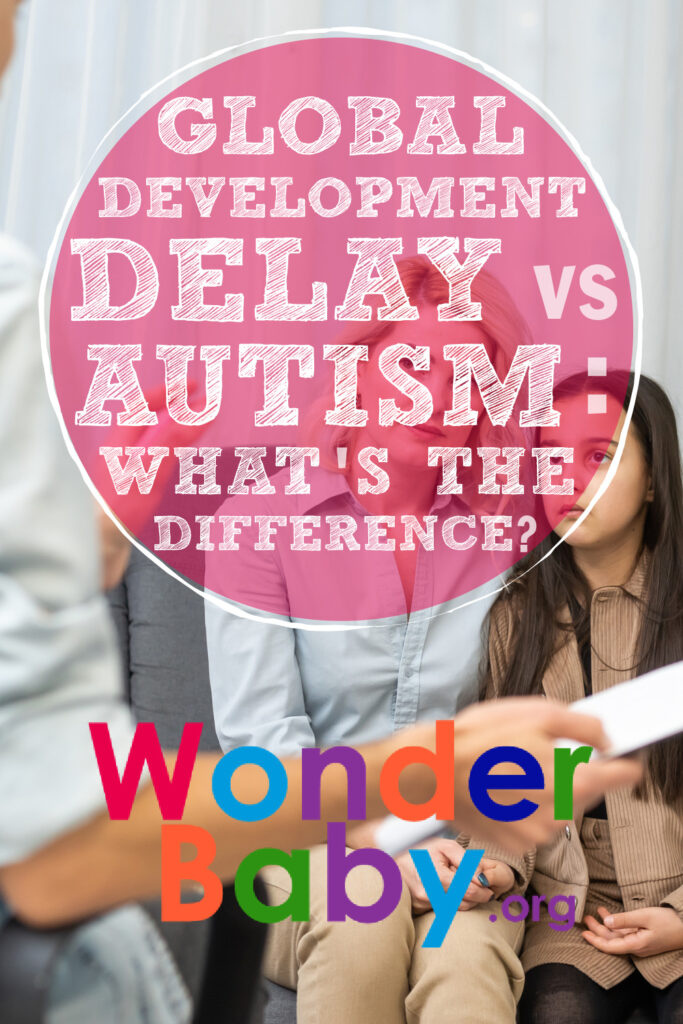Global Developmental Delay vs Autism: What’s the Difference?

- Children with global developmental delay reach developmental milestones later than other kids. They often have trouble developing their intellectual and adaptive abilities.
- Autism spectrum disorder, on the other hand, is a neurodevelopmental disorder with restricted, repetitive behavior patterns and problems involving social interaction or communication.
- As much as 28% of children with intellectual disabilities are also diagnosed with autism spectrum disorder.
- If you feel your child might have developmental delays, it’s best to have them screened for developmental disorders.
When it comes to neurodevelopmental disorders, autism might be the first thing parents think of. It’s one of the most common developmental disorders in children, along with attention deficit hyperactivity disorder, or ADHD.
As a worried parent, you may even assume that any developmental disorder is equivalent to autism. This is not true. There are different kinds of neurodevelopmental disorders, and autism is just one example.
Autism and global developmental delay are two different conditions, but some signs or symptoms can be seen in both. It’s also possible that your child may have both simultaneously.
The primary distinction is this: While global developmental delay is associated with missing out on developmental milestones, autism is linked to problems with social interaction and repetitive behavior.
What Are Developmental Milestones?
From birth onwards, your baby will pass through many stages of development, including building language, problem-solving, and gross or fine motor skills (body movement).
As your child goes through these stages, they develop and master various tasks and behaviors. Most kids achieve the most important skills—called developmental milestones—by a certain age.
Sometimes, however, a child may miss one or more developmental milestones. These are called developmental delays. Having a few developmental delays doesn’t automatically mean your child has a neurodevelopmental condition, but if your child keeps on missing their developmental milestones, then it’s best to have them screened.
Whether your child has developmental delays or not, the American Academy of Pediatrics advises all parents to have their children screened for developmental issues at 9, 18, and 30 months old.
If your doctor suspects your child may have autism, they will also screen them for autism spectrum disorders at 18 and 24 months old.

What Is a Neurodevelopmental Disorder?
Neurodevelopmental disorders are a type of developmental disorder in which the brain hasn’t developed completely or properly. This leads to problems in behavior, movement, communication, or learning. Children may have difficulties in one or more areas of development at the same time and may reach developmental milestones at a later age than other kids.
Common types of neurodevelopmental disorders include:
- Intellectual disability
- Autism spectrum disorder
- Attention deficit hyperactivity disorder (ADHD)
What Is Global Developmental Delay and Intellectual Disability?
Global developmental delay (GDD) and intellectual disability (ID) are neurodevelopmental disorders that are closely connected. About 3% of children worldwide have either GDD or ID. To understand global developmental delay, you first must know what intellectual disability is.
Intellectual Disability
Intellectual disability is a condition that affects at least two categories in a child’s development. These categories cover motor, speech, personal, and cognitive skills. Self-help skills are also included as a separate category.
Children with intellectual disabilities often have trouble developing their intellectual and adaptive abilities.
Examples of intellectual disability include:
| Intellectual Function Deficits | Adaptive Function Deficits |
| Reasoning | Communication with others |
| Planning | Personal independence |
| Problem-solving | Social interactions |
| Abstract thinking | Adapting to different environments |
| Academic learning | |
| Learning from experience | |
| Judgment |
Global Developmental Delay
The American Association on Intellectual and Developmental Disabilities has stated that symptoms should have been observed before 18 years old to diagnose ID. Because some of these signs may be difficult to evaluate in early childhood, an alternative diagnosis—global developmental delay—is used if your child has some of the symptoms before turning 5 years old.
Causes of Global Developmental Delay
The most common cause of ID and GDD are genetic disorders. Other causes include birth injuries, infections, nutritional deficiencies, and teratogens.
It’s important to note that many children with GDD may not be diagnosed with ID as they grow older. This is where early intervention with a trusted health professional becomes helpful for your child. Early treatment can lead to better outcomes for young children.
What Is Autism Spectrum Disorder?
Autism spectrum disorder (ASD) is a neurodevelopmental disorder with restricted, repetitive behavior patterns and problems in social interaction or communication. These happen early in a child’s life. Symptoms may make it difficult to do daily activities, like attending school or forming relationships with same-aged peers.
According to the Centers for Disease Control and Prevention, as many as one in 59 kids is diagnosed with some form of autism. The American Academy of Family Physicians says that there are different types of autism: autistic disorder, childhood disintegrative disorder, Asperger syndrome, and pervasive developmental disorder.
Children with autism spectrum disorder may have symptoms like:
- Deficits in Social Interactions and Communication: This may display as a lack of social awareness (unable to understand the thoughts or feelings of other people), using gestures or body language instead of words to communicate, or difficulty adjusting behavior based on the environment.
- Repetitive Behaviors: Such as spinning, flapping, and other repetitive body movements, or repeating words or phrases from other people (also known as echolalia).
- Restricted Behaviors: Some examples may be organizing toys or belongings in a particular way, eating the same food or drinking the same drinks every day, being very interested in playing with specific toys, talking too much about a favorite topic, reacting too little or too much toward their senses.
Causes of Autism Spectrum Disorder
There is a higher risk of ASD if you or your partner are at an advanced age, or if you’ve had infections, diabetes mellitus, or hypertension during your pregnancy. If your child was born prematurely or with a low birth weight, they have a higher chance of developing ASD.

Global Developmental Delay vs Autism: The Difference
At first glance, these two conditions don’t seem to have any significant difference and are hard to tell apart.
If your child has GDD, their developmental delay covers more than one category of development:
- Gross or fine motor skills
- Language skills
- Personal or social skills
- Learning or cognitive skills
- Daily activities
GDD is considered if these symptoms are present in young children. If your child is over 5 years old, they might have intellectual disability instead of global developmental delay.
For example, GDD is more likely if your 3-year-old child also has trouble speaking words, or walking around on their own. Despite these concerns, kids with GDD or ID still communicate or respond in ways that are appropriate for their age.
ASD is usually diagnosed when your child is two years of age or older. Unlike ID or GDD, the most noticeable symptoms in ASD are problems with social communication and very restrictive or repetitive behavior. Other areas of development, like motor and language skills, are at par with children of the same age.
A 2-year-old who refuses eye contact, arranges their belongings always in a particular order, and doesn’t play with other kids may have ASD. Unlike GDD, other areas of development are fine: this 2-year-old can run around, remove gloves or socks on their own, and clearly say words or phrases.
It’s possible that your child may have both GDD and ASD. As many as 28% of children diagnosed with ID/GDD will also have ASD. The best way to determine your child’s condition—or if they have both—is through a trusted health professional with experience in behavioral pediatrics.
FAQs
How are children with GDD or ASD diagnosed by doctors?
If you’re concerned that your child may have GDD or ASD, your doctor will review your child’s medical history and do a physical examination. They will go through a list of developmental milestones your child should have reached by their current age.
If your child has a neurodevelopmental disorder, your doctor will try to find the cause, and treat it if possible. This includes genetic tests, imaging tests, and other laboratory workups.
If your doctor is considering ASD, your child will undergo screening through a specially constructed interview. This is based on scientifically validated tools, like the M-CHAT-R (Modified Checklist for Autism in Toddlers, Revised) and the Diagnostic and Statistical Manual of Mental Disorders, Fifth Edition (DSM-5).
For both ASD and GDD, you may also be referred to a developmental pediatrician or child psychologist for a more comprehensive diagnosis and management.
Are GDD and ASD mental disorders?
The Australian Department of Health and Aged Care says that ASD is not a mental disorder. Note that children with ASD are more likely to have other mental illnesses as they grow into adults. Children with GDD still have room to grow as they undergo their developmental milestones. They aren’t categorized under mental disorders.

The information WonderBaby provides is not intended to be, and does not constitute, medical or other health advice or diagnosis and should not be used as such. Always consult with a qualified medical professional about your specific circumstances.
Related Posts

Eye Conditions and Syndromes, Visual Impairment
Neuralink Announces Plans to Restore Sight to the Blind with Brain Chip
Elon Musk’s company Neuralink has announced plans to begin human trials of its new “Blindsight” brain chip by the end of 2025.

Special Needs
5 Spring Cleaning Tips for Families of Children with Disabilities
Spring cleaning is an opportunity to create a more accessible, organized, and supportive space for your child with disabilities. Declutter, deep clean, and refresh!

Visual Impairment
The Gift of Understanding: How a Young Child Helps His Blind Father Navigate Life
When a parent is blind, it’s natural for people to wonder how their sighted child will adapt. Will they struggle to understand their parent’s needs? Will they feel burdened by...